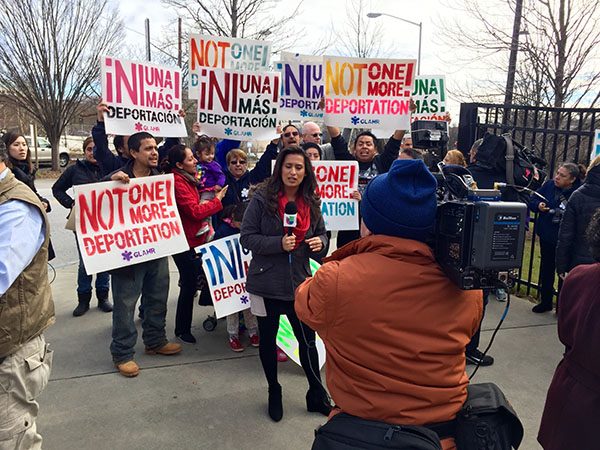ATLANTA – With the fate of a proposal to crack down on illegal immigration still unknown in the frenetic final days of Georgia’s legislative session, the bill’s author was spotted several times huddled in hushed discussions in the Capitol hallways with D.A. King.
King, 59, has been a permanent fixture at the Capitol for years, lobbying lawmakers and rallying supporters for phone and letter-writing campaigns. The broad-shouldered, 6-foot-2 activist’s approach is sometimes confrontational and always outspoken, making him a hero among those who favor stricter immigration enforcement – and earning him plenty of enemies.
His advice has been welcomed by some legislators, including state Rep. Matt Ramsey, a Republican in the Atlanta suburb of Peachtree City who authored Georgia’s strict measure.
“I can’t think of anybody in my 20 years of working on this issue who has been more adroit in working inside the state legislature to get legislation actually passed,” said Roy Beck, executive director of NumbersUSA, which pushes for tighter immigration control. “He’s just kind of at the top of the heap nationwide in terms of local activists.”
Ramsey said King provided integral guidance when drafting the new law, and he rallied supporters to pressure lawmakers with phone calls and emails.
Even though a judge last week temporarily blocked two provisions of the law, King claims victory. He cited several parts that were not blocked, saying they “will greatly deter illegal aliens from attempting to take jobs in Georgia.”
One will require businesses with 500 or more employees to use a federal database called E-Verify to check the immigration status of new hires starting Jan. 1. That requirement will be phased in for all businesses with more than 10 employees by July 2013. Another makes it a felony to use false information or documentation when applying for a job. Also starting Jan. 1, applicants for public benefits must provide at least one state or federally issued “secure and verifiable” document.
The Montgomery, Ala.-based Southern Poverty Law Center hasn’t put King’s organization on its list of hate groups.
But the center lists him as a “nativist” and has expressed concern about his tendency to call illegal immigrants “invaders” and his contact with other more extreme activists.
“His tactics have generally not been to get up in the face of actual immigrants and threaten them,” said the law center’s Heidi Beirich. “Because he is fighting, working on his legislation through the political process, that is not something we can quibble with, whether we like the law or not.”
Other critics take a harsher view.
“I think he works to push his agenda in a very divisive way,” said Jerry Gonzalez, executive director of the Georgia Association of Latino Elected Officials. “One has to look at who this man is. He is a convicted felon who is advising our legislators and our governor on very important policy matters.”
King talks openly about his felony conviction. He pleaded guilty in 1977 to a charge of interstate gambling, stemming from work he did answering phones and picking up money for a bookmaker taking bets on sporting events in Alabama.
He was ordered to pay a fine and to serve two years of probation.
The grandson of a Detroit police officer, King grew up in the suburbs of that city, served two years in the U.S. Marine Corps and built a career as an insurance agent. He had no interest in politics or activism and didn’t vote.
“What happened is when I started learning about illegal immigration, I went from being very, very shy to being very, very upset,” he said.
In the late 1990s, a Mexican family moved in across the street from the house he shares with his wife in suburban Atlanta. Before long, there were about 20 people he suspected were in the country illegally living in the three-bedroom home, the yard was full of old vehicles and loud parties disrupted the neighborhood, King said.
He complained to his local government about code violations but got no response, he said.
Then the Sept. 11, 2001, terror attacks marked his “aha moment,” he said.
“I realized if I could have people living illegally across the street from me and there are people in the country who are flying planes into our buildings, this doesn’t seem like a big effort at national security,” he said.
That’s when he began researching illegal immigration on an old hand-me-down computer from his brother-in-law.
The Pew Hispanic Center estimated Georgia’s illegal immigrant population to be about 425,000 last year, making it the state with the seventh-largest illegal immigrant population.
King stopped working as an insurance agent in 2003 to devote himself full time to his cause and held a rally at the state Capitol in 2003, the first of more than two dozen. He also was profoundly affected by five trips to the Arizona-Mexico border between 2003 and 2006, he said.
He met Billy and Kathy Inman, whose 16-year-old son, Dustin, had been killed in a car crash caused by an illegal immigrant, and in 2005 renamed his group from the American Resistance to the Dustin Inman Society at their request to make their son’s name live on, he said.
“This crisis took more than 30 years to develop,” he said. “There is no overnight solution.”
But the federal government has a fundamental duty to the secure the nation’s borders and to follow up on visas to make sure people leave once their time has expired, he said.
Federal immigration authorities also must enforce the law so illegal immigrants won’t come and won’t stay, which he calls “attrition through enforcement.” It also is important for English to be the official language of the U.S., he said.
He calls the groups who lobby against illegal immigration crackdowns “open borders crazies” and is quick to call or email journalists about their reporting on the topic.
“I know what gets left out of the news,” he said. “I know and watch every day how illegal immigration is constantly spun.”
King said he’s working on a book, but making the fight against illegal immigration a full-time job for nearly a decade has left him deep in debt and forced him to refinance his house and sell stock his grandmother left him. He said soon he’ll have to do what he can to “return to real life.”
“I’m in no way quitting,” he said, “but I don’t know that I’m going to be regarded as furniture in the Georgia Capitol next year.”














